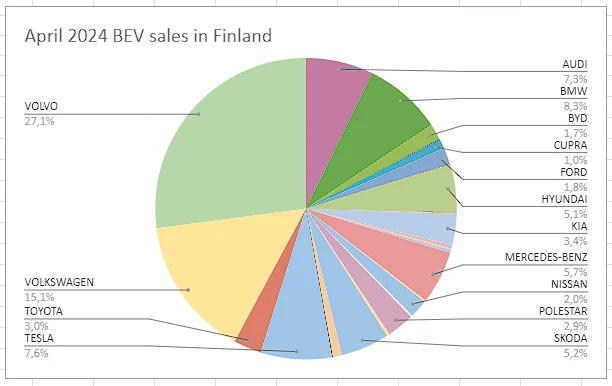Significant Decline in Tesla’s Sales and Market Share in Europe
Overview of the Situation in February 2025
The European electric vehicle market is experiencing a transformative period, with Tesla currently at the center of a downward trend that raises significant questions about its dominant market position.
Consecutive Monthly Sales Decline
Recent data reveals a consistent decline in Tesla’s performance in the European market. After a year of undisputed dominance in 2024, the American manufacturer now faces major challenges that question its growth strategy.
Dramatic Market Share Collapse
The numbers are stark: Tesla’s overall market share has plummeted spectacularly. Dropping from 2.8% last year to just 1.8% in February 2025, the company is experiencing a significant decline. The situation is even more concerning in the battery electric vehicle (BEV) segment, where its market share has fallen from 21.6% to 10.3%.
Sales Figures Comparison
The sales decline is equally impressive. While Tesla sold over 28,000 cars in February 2024, the manufacturer delivered only 17,000 vehicles in February 2025 across the European Union, United Kingdom, and EFTA countries. This represents a 42.6% decrease since the beginning of the year.
Electric Vehicle Market Context
Paradoxically, the electric vehicle market continues to grow. BEV registrations increased by 26.1% compared to February 2024, with sales rising 23.7% in the EU. Hybrid vehicles (HEV) also experienced a 19% growth, pushing the electrified vehicle market share to 58.4%, up from 48.2% the previous year.
Factors Contributing to Tesla’s Decline
Increased Competition in the EV Market
Several elements explain this slowdown:
- New Market Entrants: Traditional manufacturers and Chinese brands have launched competitive electric models. BYD, for example, experienced phenomenal growth of 94%, registering 4,400 vehicles in February.
- Impact of Chinese Brands: These manufacturers sold nearly 20,000 vehicles in Europe, significantly surpassing Tesla’s 15,700 units. Their market share increased from 1.5% to 2.5%, representing a real threat to Tesla.
- Competitive Pricing: Competing models are often offered at more attractive prices, making Tesla less competitive.
Controversies and Market Perception
Controversies surrounding Elon Musk have also played a non-negligible role. A survey reveals that over 94% of German respondents stated they no longer wanted to purchase a Tesla, illustrating significant brand rejection.
Economic Context
The slowdown of European economies has also impacted overall car sales, with a decline of 3.1% to 3.4% in February.
Performance of Other Market Players
Some manufacturers are performing well:
- Volkswagen: +4%
- Renault: +10.8%
Others are experiencing difficulties:
- Stellantis: -16.2%
- Volvo (Geely): -15%
Regulatory Landscape and Perspectives
Despite these challenges, several elements could favor a rebound:
- EU CO2 emission objectives create regulatory pressure favoring electric vehicles.
- Tesla continues to sell carbon credits to traditional manufacturers.
- The launch of the new Model Y could revive sales.
Citi analysts anticipate a stable global automotive volume this year, with continued growth in the European electric vehicle market.
The European electric vehicle market remains dynamic, with significant variations by country. Spain shows a sales increase of 11%, while Germany, Italy, and France experience declines of 6.4%, 6.2%, and 0.7% respectively.
For Tesla, the time has come for reinvention and adaptation in the face of increasingly aggressive competition and a rapidly evolving market.
Tesla’s Europe sales collapse as anti-Musk backlash grows
Tesla’s Europe sales drop nearly 45% amid row over …
Tesla’s sales and market share in Europe drop again in …




